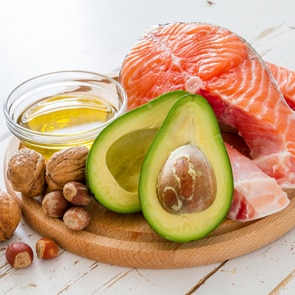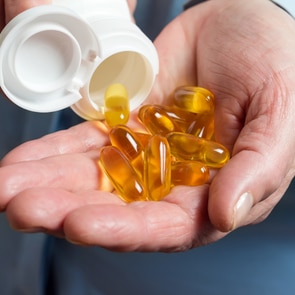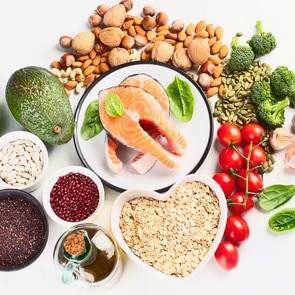Omega 3 Daily Dosage
14 Feb 2023 • 22 min read
How much omega-3 do I need?
Sometimes one of the hardest things about building a healthy diet is knowing when you’re getting enough of all the nutrients you need.
While supplements can offer the advantage of an exact amount, even those are added on to the nutrients you already consume in your diet.
This is why the best thing to do is maintain a varied and balanced diet where you can.
Still, everyone’s diets and intakes are different. Are you getting what you need?
In this article, we’ll talk about omega-3. What exactly is it? How do you know if you have enough omega 3 per day in your diet or whether you should consume more? Find out here.
The role of omega-3s in a healthy diet
Omega-3s are important for brain function, as well as heart health, inflammation, and much more.¹
They are the “good” fat your body needs, but cannot produce on its own.
There are 3 types of omega-3 fatty acids:
- ALA (alpha-linolenic acid)
- DHA (docosahexaenoic acid)
- EPA (eicosapentaenoic acid)
and you need all of them to support your overall health.

How much omega-3 should I take?
Unlike some other essential nutrients, there’s no set recommendation for omega-3.
However, Heart UK recommends the average adult gets about 500mg of EPA and DHA combined each day. That comes to about the same as a 140g portion of oily fish per week. ²
They also add that it’s best to get your omega-3 through your diet wherever possible. ²
People with certain health conditions may be recommended to take higher amounts of omega-3.
For example, some studies have suggested that people with anxiety could consume higher doses of omega-3, in the range of 200 to 2,200 mg per day. ³ There’s also evidence to suggest that EPA supplementation may have beneficial effects on depression. ⁴
Fish oil is your best source of omega-3 fats. ⁵You can easily find capsules that contain your recommended fish oil dosage. One capsule is usually enough for your fish oil daily dosage.
However, there are vegan alternatives (like algae oil and ahiflower) that contain them, too.
Should I get more EPA or DHA?
It’s best that you keep your dosage of EPA and DHA fairly even where you can. However, they perform slightly different functions, and you might need one more than the other.
If you’re aiming to help with inflammation (like joint pain, arthritis, and swelling) then you may want to opt for a fish oil or omega-3 supplement with slightly more EPA. ⁶
If you want to improve your brain function (such as concentration or mood), a higher concentration of DHA may be beneficial. ⁶
What are the signs of an omega-3 deficiency?
Most people don't get enough omega-3s, and a significant proportion of us are severely deficient. ⁷
The NHS suggests including at least two portions of fish in your diet per week, with at least one of those being oily fish. However, they don’t provide specific guidance on the amount of omega-3 you need. ⁸
If you have an omega-3 deficiency, you could experience some of these symptoms: ⁷
- Dry skin
- Poor concentration
- Joint pain
- Brain functioning issues
- Weight gain
- Eyesight problems
Of course, one or two of these symptoms alone might not mean you’re deficient in omega-3. But if you have a few of the above symptoms, and you consume little to no fish in your daily diet, then a deficiency (or another underlying health condition) is something you may want to rule out.

Dry skin
Dry skin, for example, has a range of potential causes, but one of those is a lack of omega-3s, which are important for keeping skin cells moist and strong.
Omega-3s are fatty acids that are part of your skin’s lipid content..While more research is still needed, there’s evidence to suggest that they can improve the skin’s barrier function (which helps to keep moisture in and irritants out). ⁹
If you’re not getting enough omega-3, along with dry skin, you could also experience brittle hair, thin nails, rashes, and dandruff. ¹⁰
Poor concentration, low mood, and anxiety
Poor concentration and conditions such as depression or anxiety also have multiple causes - many of which aren’t linked to your food consumption.
Omega-3s are important for producing and maintaining normal serotonin levels, which impacts your mood. ¹¹
There’s also evidence to suggest that adequate omega-3 can help with normal brain function and focus. In a study of over 2000 participants, researchers from the University of Texas found that consuming more omega-3 was associated with better ability to understand complex and abstract concepts. ¹²If you’re taking omega-3 supplements to help with low mood, current research suggests that those with higher concentrations of EPA may be more effective. However, more research is still needed in this field. ⁴ ¹³
What is the minimum amount of omega-3s I need in my diet?
There are three common types of omega-3s; ALA, EPA, and DHA.
Most people get the fatty acids they need from their daily diet; there are plenty of sources of omega-3 in all kinds of foods.
ALAs are found most often in green sources and seeds and nuts, such as walnuts, while the latter two are found in fatty fish.
Your body can convert a little bit of the ALA omega-3s into EPA and DHAs, but it uses most of them as it would other fats.
That’s why it’s vital you get EPA and DHA, as they’re important for brain and eye health. The easiest way to get the dietary omega-3s you need is by consuming two portions of fish a week, one of which should be oily fish.²
Beyond that, there are no official recommended amounts for adults. However:
- Girls
- Women who are planning a pregnancy or may have a child one day
- Pregnant and breastfeeding women
Should eat no more than 2 portions of oily fish per week. ⁸
This is because pollutants found in oily fish may build up in the body and affect the future development of a baby in the womb. ⁸
Some supplements containing omega-3 (like fish oil) may also contain vitamin A, which can be dangerous in high amounts during pregnancy. Always consult your GP before taking any new supplements, especially if you’re pregnant or breastfeeding.
What is the maximum amount of omega-3s I need ?
There’s also no firmly established upper limit for omega-3 consumption.
However, as mentioned above, you should avoid eating more than 2 portions of oily fish per week if you’re pregnant, breastfeeding, or may become pregnant in the future. ⁸
It’s advised you talk to your GP if you consume very high amounts of omega-3 - more than 3g , or about 75g of fresh salmon per day. ¹⁴ ¹⁵ Such high amounts could also increase how long you bleed for if you are injured. ¹⁵
That’s why people who take blood-thinning drugs should seek medical advice before starting on omega-3 supplements. ²

The final say
To summarise, there’s no official daily recommended omega-3 level. But most healthcare organisations suggest healthy adults get about 500mg of DHA and EPA combined.
A healthy, balanced diet should include at least 2 portions of fish a week, including 1 of oily fish. ⁸
But, if you don’t eat fish, a fish oil supplement (or a vegan omega-3 alternative) will provide the omega-3 you need.
In any case, it’s best to speak to your GP if you’re considering omega-3 supplements, so that they can recommend what’s best for you.
The advice in this article is for information only and should not replace medical care. Please check with your GP or healthcare professional before trying any supplements, treatments or remedies.
Before taking any supplements or minerals, it’s best to make sure you’re getting all the nutrients through your diet first.
Food supplements must not be used as a substitute for a varied and balanced diet and a healthy lifestyle.
Last updated: 14 February 2023